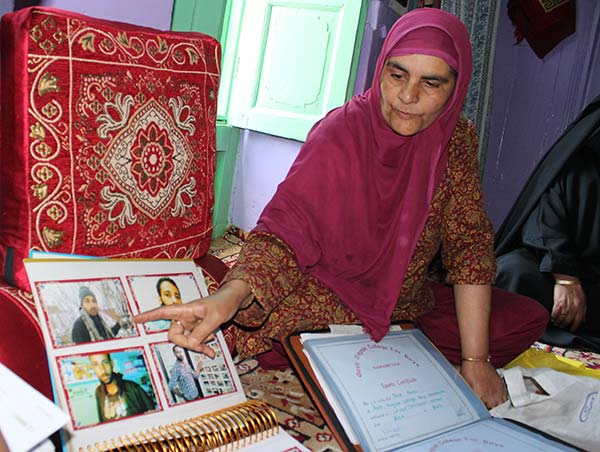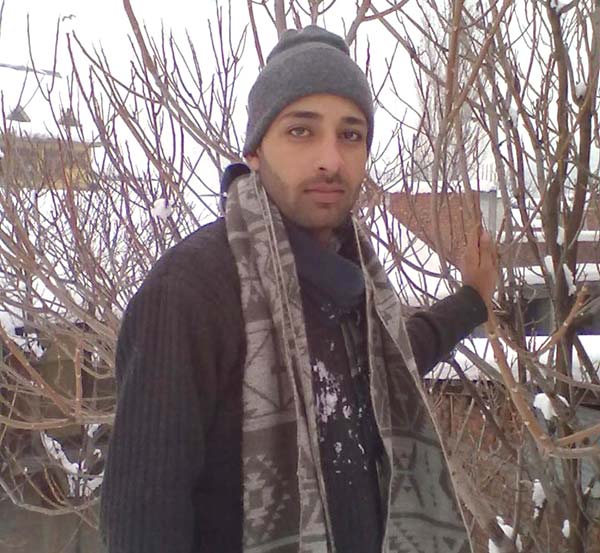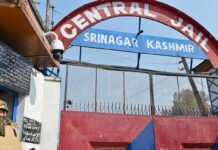Even after the magisterial inquiry found army’s version of events leading to Tahir Sofi’s death as not true, his family and eyewitness are grinded by the system. Reports Muntaha Hafizi
 The journey slinks through the dark stairs, to the rights and then to the lefts, pacing down at a point partially fluorescent, and partially obscure. It opens into a wide room that once belonged to Tahir Sofi.
The journey slinks through the dark stairs, to the rights and then to the lefts, pacing down at a point partially fluorescent, and partially obscure. It opens into a wide room that once belonged to Tahir Sofi.
Tahir Sofi, 24, was killed when army opened fire on a spontaneous protest against the hanging of Afzal Guru, a Parliament attack convict who was hanged inside New Delhi’s Tihar Jail on 9th of February, 2013. The death of Tahir brought along a terrible pain for his family that they are yet to recover from, escpecially for his mother, Mehbooba Sofi.
Mehbooba, 52, rests against a green painted window, waiting for the other two women, who followed her subtly from the kitchen, to adjust themselves.
As they recline at the other two corners of the room, with taut attentiveness, a feeling of sadness and mourning fills across this black-and-white room, and Mehbooba, in her measured tone, unfurls a painful chain of events.
It was on 5th March, 2013, when Tahir, resident of Kakar Mohalla, Baramulla was killed by army’s 46 RR (Rashtriya Rifles).
That day, Tahir had gone to market to buy a few essentials. Before leaving home, he had told his mother: “I shall come in a while. Keep my lunch served.”
“There were no protests that day. Street vendors had set up their stalls, and were running their business. People were moving and everything was normal,” says Mehbooba.
But after Tahir left, army started to traverse through Mohallas, knocking and beating everything, forcing people to come out and protest.
“All of a sudden army men appeared and started ransacking houses,” recalls Mehbooba, “They started beating our doors, and ended up misbehaving with women.”
Mehbooba, immediately called Tahir, advising him to come carefully, taking routes that were safe. But an hour after the phone call, news reached her that left her broken.
After ransacking houses army retreated towards Khanpora Bridge that separates two parts of Baramulla, to disperse the protesters assembled there.
At around 3 pm, army opened fire and a bullet hit teenaged Abass Lillu. An hour later, another two rounds were shot killing Tahir Sofi on the spot.
Mehbooba folds her hands unnervingly, and says, “One of my neighbours told me, Tahir Sebas log. (Tahir is injured). But nobody told me, he is dead.”
“When I went out to look for him, all stood with their heads down. A little boy came running towards me and said: Tahir bhaiya gow shaheeed (Tahir has been martyred).”
Mehbooba is tearful. She reveals how the death of her beloved son left her spiritually and emotionally bruised.
“Tem dame pethe aazkis damas taam, kya guzrew asi, kya baneow asi, kya wanai? (From that day, till today, what we went through, what should I tell?),” says Mehbooba, in a direct tone, as if gulping a few bitter emotions.
She quietly stands up to reach a wooden Almirah and takes out a few files. These files unfurl entire life of Tahir. The first file contains his academic records, their multiple Photostat copies, his work experience letters, and a recently updated resume, tucked at the last page. The other file is a photo album, hemmed with all the pictures of Tahir, from his childhood till death. And, the third file contains, paper cuttings, a few court papers with a copy of FIR, and a post-mortem report.

In 2012 Tahir completed his Masters in social work from Delhi. And after his return he pursued B.Ed from University of Kashmir. He was contemplating a PhD now.
Mehbooba runs her hands through the files, like a blind woman, to touch not only to know but to feel the essence of something, no longer traceable. As she turns every page, she stops for a moment, remembering Tahir, and then half satisfied, moves on to the next.
Tahir’s FIR no. 81/2013 reads: “A report by commanding officer 46 RR letter no 1065/TAS/46RR/AO Dated 13 May 2013, submitting a report, detailing the sequence of events on 5-03-2013. At 2:15 the mob attacked the army, and created a life threatening situation for the troops, prompting them to open fire and one round of low calibre weapon was aimed towards the ground after a due warning to the mob, which deterred the mob, and at 15:40 hours army party started disengagement process, and by 16:20 hours they reached to their bases.”
However an inquiry report of the case ordered by the additional district magistrate Baramulla, says “the report produced by the army is fabricated, and no such proof has been produced where youth had been seen carrying iron rods or stones, or any such weapon that could create life threatening circumstances for the army. Further it also concludes that no warning shots were fired in the air by the troops but they were directly fired upon the youth that resulted in the loss of one innocent life and injuries caused to the other teenager that rendered him handicapped for the rest of his life.”
Mehbooba is transported to Tahir. For her these files hold a life, not just a few typewritten documents.
“After his death, army started visiting our house regularly with an offer of Rs 5 lakh. They wanted us to take the case back,” says Mehbooba “But we refused.”
Mehbooba questions police’s inability to trace Tahir’s murderers. “If it is so easy for them to trace a stone pelter in a group of thousand people, why aren’t they able to find my son’s murderers?”
The hope for justice from a paralyzed system has inflicted a deep pain in Mehbooba. She closes the files in despair, and puts them back in the Almirah.
The medical reports of Tahir lie aside. “Tahir Sofi got a fire that led to severe Cranio Cerebral Trauma, further leading to cardio respiratory arrest, and the death of the deceased.”
Mehbooba returns with a book titled Phaansi – a detailed account of martyrs in Kashmir. She sits impulsively, and says, “Look at this book, the government has banned it, because this is the truth. Whatever is right, they ban it. They stifle true voices.”
Mehbooba opens the book to look for the article published on Tahir. The book has pictures of Martyrs in black-and-white. Few bold English words are typed in between the Urdu script. AFSPA, PSA, EPITOMME, EXECUTOR, RESISTANCE.
The last page of the book carries a line in Urdu, “PSA ab ek business hee nahi, amdani ka bada zarya hai (PSA is not only a business. But a major source of income too).” followed by a paragraph in English, “The end of communication is the beginning of all violence. Where communication stops, beating, burning and hanging takes place.”
Mehbooba finally finds the article, and points, “Here he is. How can I forget my child?”
As she walks back down the stairs she says, “We will keep on fighting till our last breath. We won’t barter our son’s blood, no matter what.”
Mehbooba reveals how army is harassing eyewitnesses, and Tahir’s friends. “Eyewitnesses are often called to the camp and interrogated, and humiliated. Even the car that belonged to Tahir is often stopped and checked on one pretext or another.”
Mehbooba stands barefooted on the edge of her gate, just to disappear in a few seconds. While Tahir’s father throws a sullen gaze from his small shop that lies opposite to their main gate. His gaze somewhere identifies with Mehbooba’s when she said, “Wen yeli kul neuk mule pethe czatith, wane kemuk tamah rozi insanas (When the tree is uprooted. How can one wish for a bloom).”
















Why not indeed? You are so right. It’s easy to bevelie ourselves immortal and infinite ~ when really, we should live each day fully immersed in the moment of each moment. Your words and pictures together really did make a significant point. Thank you